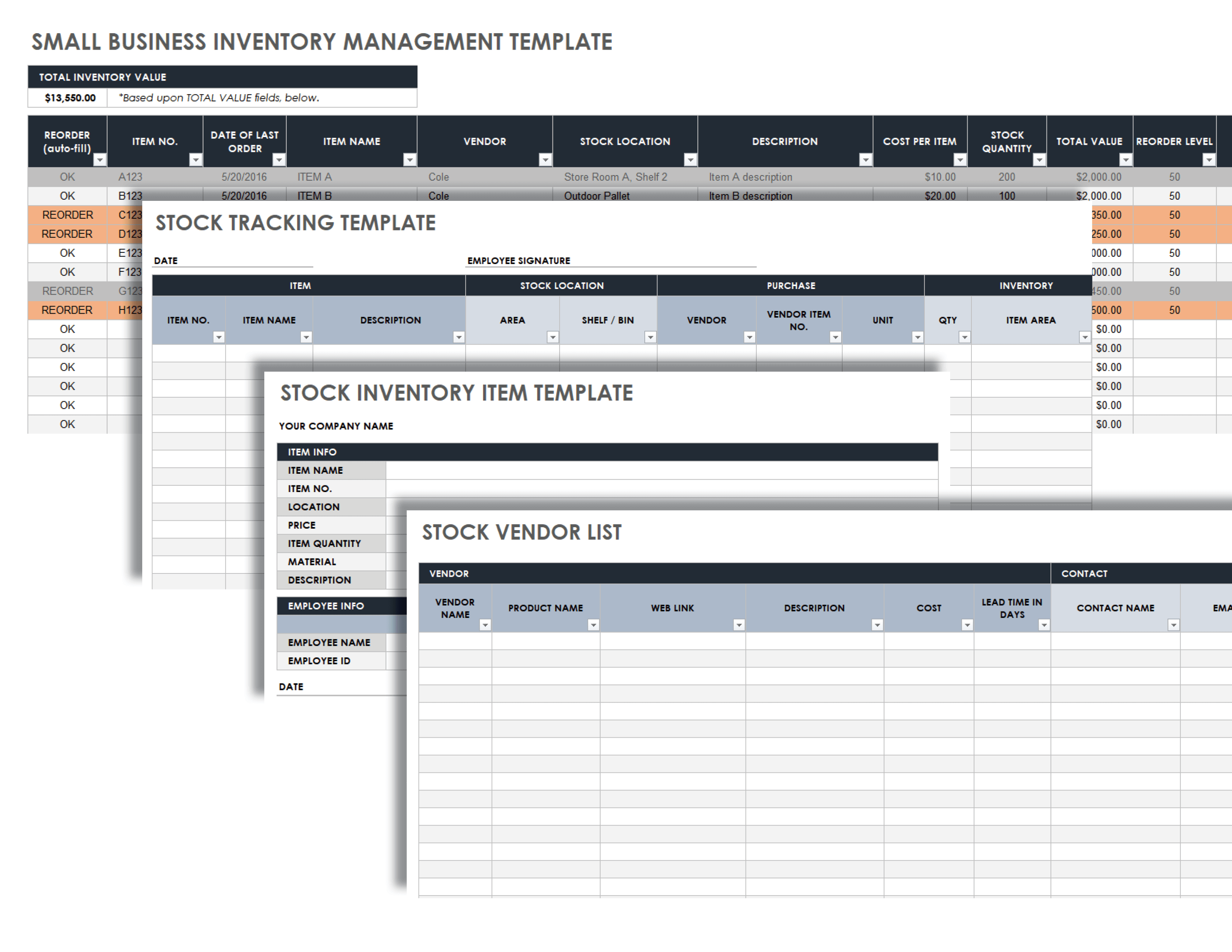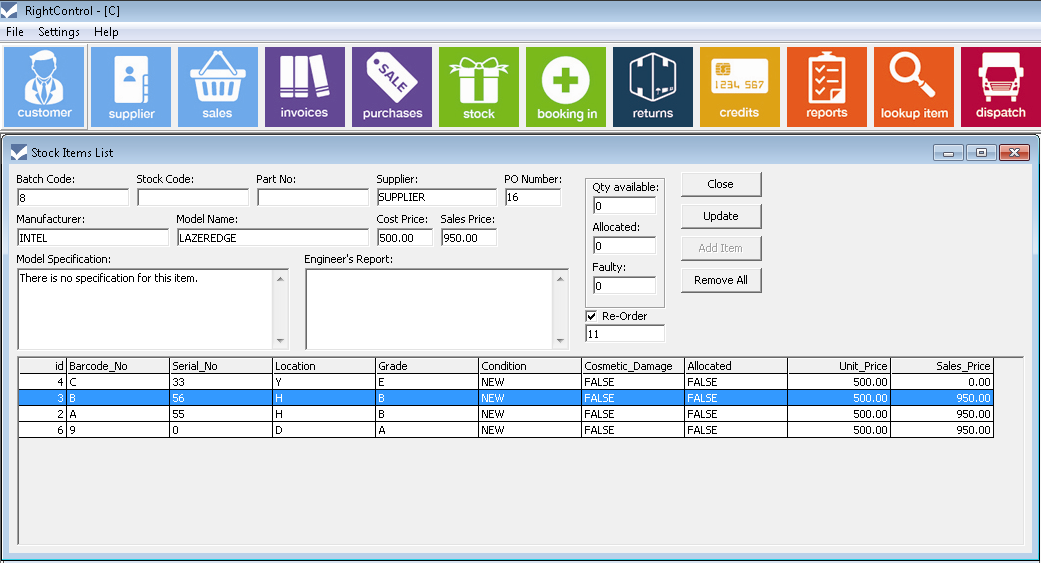Discover the transformative power of inventory management systems for small businesses! This comprehensive guide, aptly titled “Free Inventory Management System for Small Business Free Download,” will equip you with the knowledge and tools to optimize your inventory, boost efficiency, and elevate your business to new heights.
In today’s competitive business landscape, having a robust inventory management system is no longer a luxury but a necessity. For small businesses, finding a reliable and cost-effective solution can be challenging. This guide will provide you with a curated list of reputable websites offering free IMS downloads, empowering you to streamline your inventory management without breaking the bank.
Inventory Management Systems (IMS) for Small Businesses

Inventory management systems (IMS) are software applications that help businesses track their inventory levels, manage stock, and optimize their supply chain. They can be used by businesses of all sizes, but they are especially beneficial for small businesses that may not have the resources to invest in a large-scale inventory management system.IMS can help small businesses improve their inventory accuracy, reduce costs, and increase sales.
They can also help businesses avoid stockouts and overstocking, which can both lead to lost sales.There are many different types of IMS available, so it is important to choose one that is right for your business. Some of the most common types of IMS include:
- Cloud-based IMS:These systems are hosted in the cloud, which means that you can access them from anywhere with an internet connection. Cloud-based IMS are typically more affordable than on-premise IMS, and they are also easier to set up and maintain.
- On-premise IMS:These systems are installed on your own server. On-premise IMS are typically more expensive than cloud-based IMS, but they offer more control over your data.
- Open-source IMS:These systems are free to use and modify. Open-source IMS can be a good option for businesses that have the technical expertise to manage them.
When choosing an IMS, it is important to consider your business’s specific needs. You should also consider your budget, your technical expertise, and the size of your inventory.
Features to Consider When Choosing an IMS

Selecting the right inventory management system (IMS) is crucial for small businesses to streamline their operations and optimize inventory management. Here are some essential features to consider when choosing an IMS:
Cloud-Based Accessibility
Cloud-based IMSs offer numerous advantages, including:
- Remote access from any device with an internet connection
- Automatic software updates and maintenance
- Enhanced data security with regular backups
Mobile Accessibility, Inventory management system for small business free download
Mobile-friendly IMSs allow users to manage inventory on the go, enabling:
- Real-time inventory updates from anywhere
- Quick order fulfillment and shipping
- Improved customer service with instant access to inventory information
Free IMS Options for Small Businesses
Many websites offer free Inventory Management Systems (IMS) that cater to the needs of small businesses. These systems can help you track your inventory levels, manage orders, and generate reports. Here are a few reputable websites where you can download free IMS software:
- Invensis : Invensis offers a free IMS that includes features such as inventory tracking, order management, and reporting. The software is easy to use and can be customized to fit your specific needs.
- Zoho Inventory : Zoho Inventory is a cloud-based IMS that offers a wide range of features, including inventory tracking, order management, and shipping management. The software is free for up to 50 orders per month.
- NetSuite : NetSuite offers a free IMS that includes features such as inventory tracking, order management, and financial reporting. The software is designed for small businesses that need a comprehensive IMS solution.
- Odoo : Odoo offers a free IMS that includes features such as inventory tracking, order management, and manufacturing management. The software is open source and can be customized to fit your specific needs.
- Fishbowl : Fishbowl offers a free IMS that includes features such as inventory tracking, order management, and shipping management. The software is designed for small businesses that need a powerful and affordable IMS solution.
Once you have downloaded an IMS, you will need to install it on your computer. The installation process will vary depending on the software you choose. However, most IMS software is easy to install and can be up and running in a matter of minutes.
Implementing an IMS in a Small Business

Implementing an IMS in a small business involves several key steps:
- Assess your business needs:Determine the specific requirements of your business, including the types of inventory you manage, the volume of inventory, and the level of control you need.
- Choose an IMS software:Research and select an IMS software that meets your business needs and budget. Consider factors such as features, ease of use, and customer support.
- Implement the IMS:Install the IMS software and configure it to match your business processes. This may involve setting up inventory categories, defining stock levels, and integrating with other systems.
- Train your staff:Ensure that your staff is adequately trained on how to use the IMS effectively. This includes training on inventory management best practices and how to use the software.
- Monitor and maintain the IMS:Regularly review inventory levels, track inventory movements, and conduct inventory audits to ensure accuracy and prevent losses.
Importance of Data Accuracy and Regular Inventory Audits
Maintaining accurate inventory data is crucial for effective inventory management. Inaccurate data can lead to overstocking, understocking, and poor decision-making. Regular inventory audits help verify the accuracy of inventory records and identify any discrepancies or losses.By conducting regular inventory audits, businesses can:
- Verify inventory levels:Ensure that physical inventory matches the records in the IMS.
- Identify discrepancies:Detect any errors or discrepancies between physical inventory and IMS records, such as missing or damaged items.
- Prevent losses:Identify potential losses due to theft, shrinkage, or obsolescence.
- Improve decision-making:Accurate inventory data supports informed decision-making regarding purchasing, production, and sales.
Case Studies of Small Businesses Using IMS
Implementing an Inventory Management System (IMS) can bring significant benefits to small businesses. Here are some success stories of small businesses that have implemented IMS and experienced positive outcomes:
These case studies demonstrate the tangible benefits that IMS can provide to small businesses, including improved efficiency, reduced costs, and enhanced customer satisfaction.
Case Study 1: ABC Bookstore
ABC Bookstore is a small, independent bookstore that struggled with managing its inventory. The store had a large selection of books, but it was often difficult to keep track of what was in stock and what needed to be ordered.
This led to lost sales and unhappy customers.
After implementing an IMS, ABC Bookstore was able to streamline its inventory management process. The system provided real-time visibility into the store’s inventory levels, making it easy to identify items that were running low and needed to be reordered. This resulted in a significant reduction in lost sales and improved customer satisfaction.
Case Study 2: XYZ Manufacturing
XYZ Manufacturing is a small manufacturer that produces custom parts for other businesses. The company had a complex inventory system that was difficult to manage manually. This led to errors in order fulfillment and delays in production.
After implementing an IMS, XYZ Manufacturing was able to automate its inventory management process. The system integrated with the company’s ERP system, which allowed for real-time updates to inventory levels. This resulted in improved order accuracy and reduced production delays.
Best Practices for Inventory Management: Inventory Management System For Small Business Free Download

Effective inventory management is crucial for small businesses to maintain optimal stock levels, reduce waste, and enhance profitability. By implementing best practices, businesses can streamline their inventory processes and achieve improved operational efficiency.
Optimizing inventory levels involves finding the right balance between holding too much or too little stock. Overstocking can lead to increased storage costs, obsolescence, and potential losses, while understocking can result in stockouts and lost sales. To optimize inventory levels, businesses should consider factors such as historical demand, lead times, safety stock requirements, and product seasonality.
Demand Forecasting
Accurate demand forecasting is essential for inventory management. By predicting future demand, businesses can plan their inventory levels accordingly. Various forecasting techniques can be used, such as historical data analysis, trend analysis, and market research. Effective demand forecasting helps businesses avoid stockouts, reduce excess inventory, and improve overall inventory turnover.
Supplier Relationships
Establishing strong relationships with suppliers is crucial for effective inventory management. Reliable suppliers can ensure timely delivery, provide quality products, and offer competitive pricing. Businesses should evaluate potential suppliers based on factors such as lead times, product quality, delivery performance, and customer service.
Building strong supplier relationships can help businesses secure favorable terms, reduce lead times, and mitigate supply chain disruptions.
Final Conclusion

Embarking on the journey of implementing an IMS in your small business can unlock a treasure trove of benefits, including reduced costs, enhanced efficiency, and improved customer satisfaction. By leveraging the insights and strategies Artikeld in this guide, you can transform your inventory management practices and set your business on a path to sustained success.
Remember, a well-managed inventory is the backbone of a thriving small business. Embrace the power of technology and empower your business with the right inventory management system today!
FAQ Overview
What are the key benefits of using an IMS for small businesses?
IMSs offer a range of benefits for small businesses, including reduced costs, improved efficiency, enhanced customer satisfaction, and better decision-making.
How do I choose the right IMS for my business?
Consider factors such as the size of your business, your inventory needs, your budget, and the features that are important to you. Cloud-based IMSs and mobile accessibility are becoming increasingly important.
How do I implement an IMS in my business?
Implementing an IMS involves gathering data, setting up the system, training staff, and monitoring performance. Regular inventory audits and data accuracy are crucial for success.
